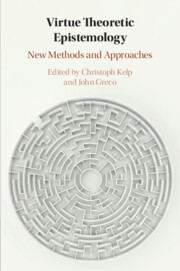Book contents
- Virtue Theoretic Epistemology
- Virtue Theoretic Epistemology
- Copyright page
- Contents
- Figures
- Contributors
- Acknowledgements
- Introduction
- Chapter 1 Closed-Mindedness As an Intellectual Vice
- Chapter 2 Epistemic Virtues and Virtues with Epistemic Content
- Chapter 3 Difficulty and Knowledge
- Chapter 4 What Is Epistemic Entitlement?
- Chapter 5 Knowledge-Producing Abilities
- Chapter 6 Virtue Epistemology, Two Kinds of Internalism, and the Intelligibility Problem
- Chapter 7 Knowledge Is Extrinsically Apt Belief
- Chapter 8 Explaining Knowledge
- Chapter 9 Anti-risk Virtue Epistemology
- Chapter 10 Responsibilism within Reason
- Index
- References
Chapter 2 - Epistemic Virtues and Virtues with Epistemic Content
Published online by Cambridge University Press: 16 July 2020
- Virtue Theoretic Epistemology
- Virtue Theoretic Epistemology
- Copyright page
- Contents
- Figures
- Contributors
- Acknowledgements
- Introduction
- Chapter 1 Closed-Mindedness As an Intellectual Vice
- Chapter 2 Epistemic Virtues and Virtues with Epistemic Content
- Chapter 3 Difficulty and Knowledge
- Chapter 4 What Is Epistemic Entitlement?
- Chapter 5 Knowledge-Producing Abilities
- Chapter 6 Virtue Epistemology, Two Kinds of Internalism, and the Intelligibility Problem
- Chapter 7 Knowledge Is Extrinsically Apt Belief
- Chapter 8 Explaining Knowledge
- Chapter 9 Anti-risk Virtue Epistemology
- Chapter 10 Responsibilism within Reason
- Index
- References
Summary
The investigation of epistemic virtues, such as curiosity, open-mindedness, intellectual courage and intellectual humility is a growing trend in epistemology. An underexplored question in this context is: what is the relationship between these virtues and other types of virtue, such as moral or prudential virtue? This paper argues that, although there is an intuitive sense in which virtues such as intellectual courage and open-mindedness have something to do with the epistemic domain, on closer inspection it is not clear to what extent they should be understood as genuine epistemic virtues. We draw a distinction between epistemic virtues and virtues with epistemic content and provide reason to believe that the aforementioned virtues are moral virtues with epistemic content rather than bona fide epistemic virtues. The upshot is that there are far fewer epistemic virtues out there than commonly assumed.
Keywords
- Type
- Chapter
- Information
- Virtue Theoretic EpistemologyNew Methods and Approaches, pp. 42 - 57Publisher: Cambridge University PressPrint publication year: 2020
References
- 1
- Cited by

